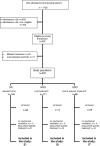Impact of digestive and oropharyngeal decontamination on the intestinal microbiota in ICU patients
- PMID: 20232045
- PMCID: PMC2900589
- DOI: 10.1007/s00134-010-1826-4
Impact of digestive and oropharyngeal decontamination on the intestinal microbiota in ICU patients
Abstract
Purpose: Selective digestive microbial decontamination (SDD) is hypothesized to benefit patients in intensive care (ICU) by suppressing Gram-negative potential pathogens from the colon without affecting the anaerobic intestinal microbiota. The purpose of this study was to provide more insight to the effects of digestive tract and oropharyngeal decontamination on the intestinal microbiota by means of a prospective clinical trial in which faecal samples were collected from ICU patients for intestinal microbiota analysis.
Methods: The faecal samples were collected from ICU patients enrolled in a multicentre trial to study the outcome of SDD and selective oral decontamination (SOD) in comparison with standard care (SC). Fluorescent in situ hybridization (FISH) was used to analyze the faecal microbiota. The numbers of bacteria from different bacterial groups were compared between the three regimens.
Results: The total counts of bacteria per gram faeces did not differ between regimens. The F. prausnitzii group of bacteria, representing an important group among intestinal microbiota, was significantly reduced in the SDD regimen compared to the SC and SOD. The Enterobacteriaceae were significantly suppressed during SDD compared to both SOD and SC; enterococci increased in SDD compared to both other regimens.
Conclusions: The composition of the intestinal microbiota is importantly affected by SDD. The F. prausnitzii group was significantly suppressed during SDD. This group of microbiota is a predominant producer of butyrate, the main energy source for colonocytes. Reduction of this microbiota is an important trade-off while reducing gram-negative bacteria by SDD.
Comment in
-
Selective decontamination of the digestive tract: selectivity is not required.Intensive Care Med. 2010 Oct;36(10):1783-1784. doi: 10.1007/s00134-010-1945-y. Epub 2010 Jul 7. Intensive Care Med. 2010. PMID: 20607517 Free PMC article. No abstract available.
References
-
- Liberati A, D’Amico R, Pifferi, Torri V, Brazzi L (2004) Antibiotic prophylaxis to reduce respiratory tract infections and mortality in adults receiving intensive care. Cochrane Database Syst Rev (CD000022) - PubMed
Publication types
MeSH terms
LinkOut - more resources
Full Text Sources


